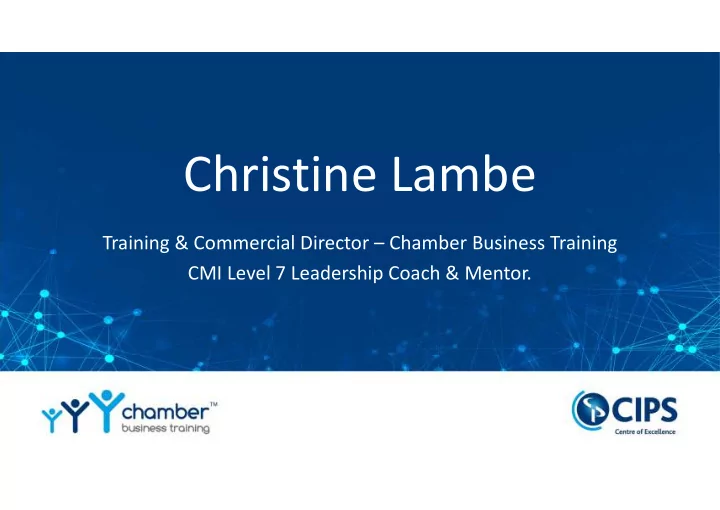

Christine Lambe Training & Commercial Director – Chamber Business Training CMI Level 7 Leadership Coach & Mentor.
Health & Wellbeing is a state of physical, mental & social wellbeing?
Understand how your brain works Research Finding Implications for Learning Your memory will increase if Little and often is the key to you have studied frequently engaging long term memory. and recently. Emotions strengthen memory Personalise the subject to you. What are your experiences? Plus, reward yourself! Learning causes changes to Engaging in learning increases the physical structure of the our ability to learn. Dendrites brain (neural pathways) are Studies have shown that after around 30 minutes, the brain strengthened every time we stops retaining new information. learn! Memories are stored in Engage all senses when multiple parts of the brain learning, play relaxing music Adapted from :https://www.trainingindustry.com/content-development/articles/how-the-brain-learns.aspx even light a scented candle.
��� Know your style and play to it Make Group related ideas recordings and Mind map together listen to them as you drive Visual Auditory Make it visually pleasing •PowerPoints •Podcasts Consider using post its on a •Videos •Discussions large area of your study •Pictures •Presentations room •Articles •Models •Colour Kinesthetic Role Playing Note Taking Highlighting Quizzes
������� ���� ���������������������������
Revision Science Recent scientific studies have found that there are only two revision techniques which really work. 1) Testing yourself or get someone else to test you. 2) Spreading your revision out over time, taking the little and often approach. "Testing itself, when you get the correct answers appears to produce a more elaborative memory trace, connected with your prior knowledge, so you're building on what you know". Professor Dunlovsky, Kent State University. So what about cramming? Cramming will only address the short term memory, so it might get you through, but it won’t help with knowledge retention.
The Feynman Technique “The first principle is that you must not fool yourself and you are the easiest person to fool.” – Richard Feynman (Nobel Prize winning physicist ) .
Planning Manage your time: create a visual plan with a level of detail that works for you and build in downtime. Find a quiet study area: The less distracted you are, the more chance you have of retaining key information.
Dealing with Nerves. Understand where stress comes from. Stress is a historical reaction, fight, freeze or flight! Understand how it impacts on you. Once you’ve named your demons, they have less power. Use tried and tested techniques to minimise the impact. Understanding what is the worst that can happen? Is it really that bad? One Minute Mindfulness: https://www.youtube.com/watch?v=F6eFFCi12v8 Being fully revised and prepared for an exam will reduce your stress levels!
And finally…. Don’t add to your stress, arrive at the centre with your I.D. and confirmation of your exam booking 30 minutes before the exam starts. Make sure you have made time to eat prior to the exam and keep hydrated. A good nights sleep prior to the exam will give you the best chance at performing at your best. Once the exam is over, try and put it out of your mind until results day which for this series is the final week of January 2018.
Recommend
More recommend